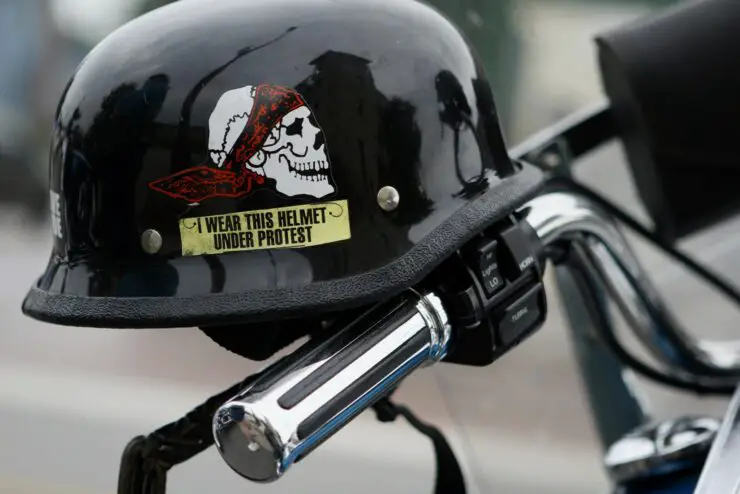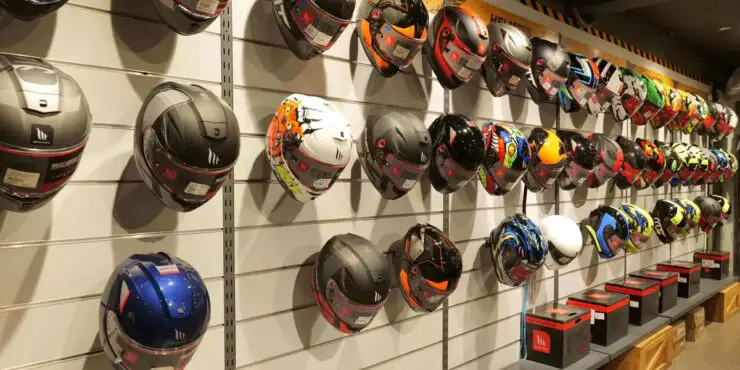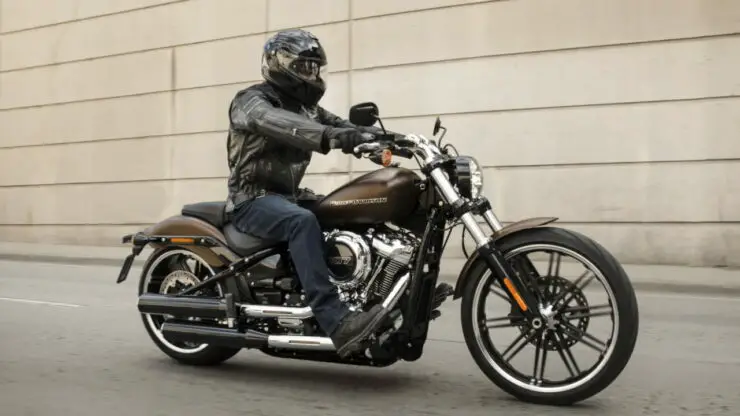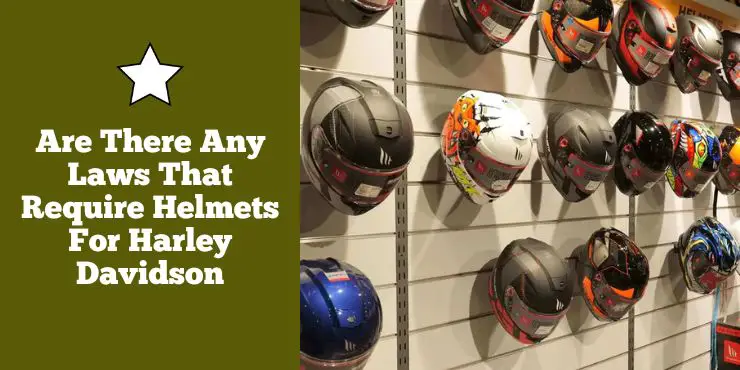Riding a Harley-Davidson is a dream come true for many motorcycle enthusiasts, but are there any laws that require riders to wear helmets? It’s an important question to ask before hopping on that bike and hitting the open road.
Helmet laws vary by location; some states in the U.S. mandate helmet use for all riders, while others require it only for certain age groups or experience levels. Check local regulations.
In this article, we’ll explore the legal requirements for helmets when riding a Harley-Davidson. So, if you’re curious about the answer to this question, read on to find out!
Are there any laws that require helmets for Harley-Davidson bikers?
Motorcycle helmet laws play a key role in promoting rider safety and reducing the risk of severe injuries or fatalities on the road. As motorcycling continues to gain popularity in the United States, understanding the regulations surrounding helmet usage becomes paramount for Harley-Davidson bikers and policymakers alike.
>>> Click here to read our review of the Best Helmet For Harley-Davidson <<<
Motorcycle helmets are vital safety gear that protects bikes from head injuries in the event of an accident. They serve as a primary defense against traumatic brain injuries, which can have long-standing and life-altering consequences. In fact, according to the National Highway Traffic Safety Administration (NHTSA), wearing a helmet reduces the risk of a fatal head injury by 37% and lowers the risk of non-fat injuries by 67%.
To know are there any laws that require helmets for Harley-Davidson riders, you will need to have an idea of the different states in the United States. Motorcycle helmet laws in the United States fall into three main categories – universal helmet laws, partial helmet laws, and no helmet laws.
First, there are Universal Helmet Laws. Currently, there are 19 states, including the District of Columbia that have universal helmet laws in place. These laws require all bikers, regardless of their age, to wear helmets that meet specific safety standards. States with universal helmet laws prioritize rider safety and aim to minimize the risk of head injuries among motorcyclists.
Secondly, there are partial helmet laws. There are 28 states that have partial helmet laws, which typically apply to specific groups of riders, such as those under a certain age or with less than a certain level of riding experience. These laws require riders falling within the specified criteria to wear helmets while others are allowed to ride without one. The criteria and age thresholds for helmet usage can vary significantly from state to state.
Lastly, there are regions with no helmet laws. There are only three states – Illinois, Iowa, and New Hampshire that don’t have any motorcycle helmet laws. In these states, bikers are free to choose whether or not to wear a helmet. However, despite the absence of helmet laws, it is important for bikers to recognize the potential risks associated with riding without head protection.
The effectiveness of helmet laws in reducing motorcycle fatalities and injuries cannot be overstated. Studies have consistently demonstrated that states having universal helmet laws experience lower rates of head injuries and fatalities compared to states without such laws. Universal helmet laws also help in reducing the financial burden on society by minimizing the long-term healthcare costs associated with severe head trauma.
States having partial helmet laws often experience higher rates of fatalities and head injuries, especially among riders exempt from wearing helmets. In accidents involving riders not wearing helmets, the risk of severe head trauma and fatality is significantly higher compared to those who do wear helmets.
The issue of motorcycle helmet laws has long been a subject of debate across the nation. The advocates for universal helmet laws argue that helmets are necessary to protect riders and reduce the societal costs associated with severe injuries. Meanwhile, the naysayers of helmet laws argue for personal freedom and the right to choose whether or not one wants to wear a helmet while riding.
Public opinion on helmet laws is diverse, with differing viewpoints based on personal beliefs and experiences. Surveys have shown that an overwhelming majority of Americans support helmet laws, recognizing their importance in safeguarding the rider’s well-being.

State-level motorcycle helmet laws in the USA
Is it illegal in the United States to ride if you aren’t wearing a helmet? Technically no, there is currently no federal law that requires a motorcyclist to wear a helmet. What it means is that there are dozens of motorcycle helmet laws by state but none of them apply to the entire nation. Between 1967 and 1976, the federal government incentivized states to pass their own motorcycle helmet requirements but not all the states currently have those requirements since Congress lifted the federal authority.
In today’s world, every state has its own laws and rules. For instance, people who are over the age of 17 can get away without wearing a helmet in Maine but they won’t have the same fate in Tennessee. Motorcycle helmet laws range so vividly that if you are planning a road trip or tour, you will need to either check every state you will be driving through ahead of time or simply assume that you will need to bring a high-quality helmet for the entire trip.
Each state has its own laws pertaining to wearing motorcycle helmets when driving. These range from universal helmet laws, such as in California, needing that the helmet must be worn by anyone riding on a bike regardless of their age to states like Illinois, which don’t have any laws pertaining to the use of motorcycle helmets by operators or passengers. Here is a summary of the motorcycle helmet laws from state to state so that you can stay in compliance with the law regardless of where you’re driving.
States requiring all motorcyclists to wear helmets
Here are the states where the universal motorcycle law is mandatory. In these states, you will need to wear a motorcycle helmet universally, which means it will apply to all motorcycle drivers and passengers regardless of their age. Here are the states that require all motorcyclists to wear helmets –
- Alabama
- California
- Mississippi
- Georgia
- Nevada
- Massachusetts
- Maryland
- North Carolina
- Nebraska
- Oregon
- New York
- Virginia
- Tennessee
- New Jersey
- Oregon
- West Virginia
- Washington
- Vermont
All these states have the universal helmet law active for people of all age groups. Crossing into these states means that you must be wearing a helmet. Moreover, your passenger must be wearing one as well. The states on the coasts are stricter on these laws. So if you’re planning a big East Coast or West Coast road trip, you must be wearing a helmet the entire time you’re driving.

States requiring helmets for riders under a certain age
Most of the states in the US have some form of law but not necessarily a universal requirement. Generally, these states are concerned more with young riders and passengers. In states like Texas, South Carolina, and more, the motorcycle helmet law only applies to people who are younger than 20 years. Here are the different states and their different laws pertaining to certain age groups –
- States where riders 25 years old and younger will need helmets – Missouri
- States where riders 20 years old and younger will need helmets – Arkansas, Michigan, Florida, Pennsylvania, Kentucky, South Carolina, Rhode Island, Utah, and Texas
- States where riders 18 years old and younger will need helmets – Delaware
- States where riders 17 years old and younger will need helmets – Alaska, Colorado, Arizona, Indiana, Connecticut, Idaho, Hawaii, Kansas, Minnesota, New Mexico, Maine, Montana, Ohio, North Dakota, South Dakota, Wyoming, Oklahoma, and Wisconsin
States with no motorcycle helmet laws
States like Illinois, New Hampshire, and Iowa are the only states that don’t have any motorcycle helmet laws. By state law, you aren’t necessarily required to wear a helmet when driving on a motorcycle in states like New Hampshire. However, as soon as you cross over to Vermont, which requires a helmet for both the rider and the passenger, you will need to put the helmet on. At one point, Iowa had a universal helmet law but it got repealed in 1976. Similarly, Illinois also had a universal helmet law but it was repealed in 1970.
Helmet laws for other two-wheelers
For many states, you are still required to wear a helmet even if your vehicle is another type – a moped. Here are the states that require helmets for mopeds and other kinds of motorcycle-type vehicles – Alaska, California, Alabama, Colorado, Arkansas, Connecticut, Kansas, Hawaii, Minnesota, Indiana, Massachusetts, Maryland, Mississippi, Louisiana, New Jersey, Ohio, Nebraska, Oregon, Jew Jersey, North Dakota, South Dakota, Nevada, North Carolina, Rhode Island, Pennsylvania, Texas, Utah, Tennessee, Virginia, West Virginia, and Washington.
For states like New York and Maine, a helmet is only needed if the vehicle meets certain qualifications like does it have a certain amount of horsepower or can it reach certain speeds.
What happens if you ride a Harley-Davidson motorcycle without a helmet?
It is common to wonder if it is illegal to ride a Harley-Davidson bike without a helmet. If you’re taking a trip across the country on your Harley, you know that changing lanes on a highway without signaling would result in a traffic ticket. It doesn’t matter which state you are driving in because of the consistency in laws from one state to the other.
Unless you are in the same state where you live and have received your license to operate a Harley, you might not be able to answer a simple question that could keep you from getting pulled over by police officers – is it illegal to ride a Harley without a helmet? Some states have made helmets mandatory for both bikers and passengers. Meanwhile, other states only require helmets for youngsters while some of them don’t require a helmet for anyone.
Say that you have been caught without a helmet in a state that needs one, will there be any penalty for not wearing a helmet? Similar to the requirements of wearing a helmet while riding on a Harley differs from state to state so does the punishment. There are different penalties imposed for helmet violations in states that have motorcycle helmet laws. To get a better idea of the types of penalties you might face for violating a state’s motorcycle helmet law, here is a look at the helmet laws in four major states – California, New York, Texas, and Florida.
Penalty for violating the motorcycle helmet law in California
The motorcycle helmet law in California requires the rider and the passenger regardless of their age to wear a helmet that meets the DOT safety standards. Moreover, the helmet must be properly fastened to the head with the straps affixed to the helmet. A violation of the motorcycle helmet law will be punishable by a fine in an amount determined by the court.
Penalty for violating the motorcycle helmet law in Texas
Unlike California, Texas has a partial instead of universal helmet law that is applicable to individuals who are younger than 21 years of age. A violation of the helmet law isn’t a primary offense, which means the police officer might not stop you solely for determining if you’re violating the helmet law.
The police officer will need another violation of the law as the primary reason for stopping you. A violation of the motorcycle helmet law in Texas is a misdemeanor and is punishable by a fine of a figure of at least $10 or more than $50.
Penalty for violating the motorcycle helmet law in New York
Riding a Harley-Davidson bike without a helmet that’s held in place properly on your head via the straps affixed to the helmet is a violation of the helmet law. The penalty for violating the motorcycle helmet law in New York is a fine of as much as $100, up to 30 days in jail, or a combination of both.
Penalty for violating the motorcycle helmet law in Florida
If you’re 21 years of age or more and have an insurance policy with a minimum of $10,000 in medical coverage for injuries you might suffer in a motorcycle crash, then the Florida motorcycle law doesn’t require you to necessarily wear a helmet.
A violation of the helmet law will only be a noncriminal traffic infraction that isn’t punishable as a moving violation for which you could be ordered to pay a fine plus administration fees and court costs.
Benefits of wearing a helmet for Harley-Davidson bikers
When it comes to riding a motorcycle, particularly a Harley-Davidson bike, the feeling of thrill and exhilaration of the open road is undeniable. However, with the thrill comes the responsibility of ensuring your safety. Wearing a helmet is one of the most important safety measures that every Harley-Davidson biker must prioritize. Here are the benefits of wearing a helmet, emphasizing why it is important for the protection and well-being of the rider.
#1. Protection and injury prevention
The primary purpose of a helmet is to protect the rider’s head in case of an accident. The human head is vulnerable to severe injuries in motorcycle crashes, including traumatic brain injuries (TBIs). Wearing a helmet significantly reduces the risk of head injuries, skull fractures, and brain trauma. It’ll act as the first line of defense, absorbing and dispersing the impact forces that can lead to life-altering injuries.
#2. Reduced risk of fatalities
Studies have consistently demonstrated that wearing a helmet reduces the risk of fatalities in motorcycle accidents. According to the National Highway Traffic Safety Administration (NHTSA), helmets have been estimated to be 37% more effective in preventing fatal head injuries among motorcycle riders. By wearing a helmet, Harley-Davidson bikers significantly improve their chances of survival in the event of a crash.
#3. Protection against non-fatal injuries
Even if an accident doesn’t result in a fatality, it can still result in a serious non-fatal injury with long-lasting consequences. Helmets are effective in reducing the severity of injuries, minimizing the risk of facial trauma, dental injuries, and other debilitating conditions. Wearing a helmet can prevent or mitigate injuries that might result in long-term disabilities or extensive medical treatment.
#4. Shielding against environmental factors
Helmets offer protection against environmental factors that might impede a rider’s comfort and safety. They act as a barrier against wind, debris, rain, insects, and adverse weather conditions. This protection allows riders to maintain focus and concentration, improving their overall riding experience and reducing distractions.
#5. Enhanced visibility
Many helmets feature reflective elements or vibrant colors that enhance a rider’s visibility on the road. Increased visibility is important for other vehicles to spot you, especially during low-light conditions or in heavy traffic. By wearing a helmet with reflective elements, you will be able to improve your visibility and reduce the risk of accidents caused by other drivers’ lack of awareness.
#6. Boost in confidence and focus
Wearing a helmet can boost a rider’s confidence and peace of mind. Knowing that their head is protected, a Harley-Davidson biker will be able to ride with greater assurance and focus on the road ahead. The absence of worries about potential injuries allows you to enjoy the ride and fully engage in the experience.
#7. Compliance with legal requirements
Helmet laws vary from state to state but many of them do require the rider to wear a helmet at all times. Complying with the legal requirements will not only help you keep you safe but it’ll also help you avoid fines and legal issues. By wearing a helmet, you will demonstrate your commitment to safety and set a good example for other riders.

Factors to consider when choosing a Harley-Davidson helmet
When it comes to riding a Harley-Davidson bike, safety is paramount. One of the important aspects of rider safety is selecting the right helmet. A well-fitted and high-quality helmet will not only offer protection but it’ll also complement the iconic Harley-Davidson style. Here are some of the essential factors that must be considered when choosing a helmet for your Harley-Davidson riding experience.
#1. Safety standards and certifications
The primary factor to consider when selecting a Harley-Davidson helmet is its compliance with safety standards and certifications. Look for helmets that meet or exceed the safety standards set by recognized organizations like the Department of Transportation (DOT) or Snell. These certifications will ensure that the helmet has undergone rigorous testing for impact resistance, penetration, and retention system effectiveness.
#2. Fit and comfort
A properly fitting helmet is important for both safety and comfort. When trying on motorcycle helmets, you need to consider aspects like size, shape, weight, and more. Helmets come in different sizes and shapes to accommodate various head shapes and sizes. Measure your head circumference and refer to the manufacturer’s size chart for finding the right fit.
The interior liner and padding play a key role in providing comfort and a secure fit. Look for helmets with removable and washable lines to maintain hygiene. A lightweight helmet reduces strain on the neck during long rides and enhances overall comfort. Opt for a helmet with effective ventilation systems like vents and channels to promote airflow and prevent excessive heat buildup.
#3. Noise reduction aspect
Harley-Davidson bikes are known for their distinctive rumble but prolonged exposure to loud noise can be damaging to hearing. Look for helmets with effective noise reduction fefatures, such as soundproofing materials and well-designed padding, to enhance your riding experience and protect your hearing.
#4. Visibility and shield options
Good visibility is important for rider safety. Look for helmets with a wide field of vision and anti-fog features. Moreover, consider the availability of different shield options such as clear, tinted, or mirrored visors to suit different lighting conditions and personal preferences.
#5. Helmet style and design
Harley-Davidson bikers appreciate the iconic style and aesthetics associated with the brand. Consider the helmet’s design and choose one that complements the Harley-Davidson image. Whether you prefer a classic open-face helmet, a full-face helmet, or a modular helmet that offers versatility, there are options available that match the distinctive Harley-Davidson aesthetic.
#6. Communication system compatibility
If you frequently ride with a group or use a communication system, you should consider helmets that are compatible with built-in speaker pockets or Bluetooth communication systems. These features allow for the seamless integration of communication devices, enhancing connectivity and rider convenience.
#7. Price and warranty
While it is essential to choose a helmet that meets your needs, it is important to consider your budget as well. You should set a realistic price range and look for helmets within that range without compromising on safety and quality. Moreover, check the warranty offered by the manufacturer to ensure that you have recourse in case of any defects or issues.
FAQ
Are helmets required by law for Harley Davidson riders?
The laws regarding helmet use for Harley Davidson riders vary by state. Most states have laws that require helmet use for all motorcyclists, but some states have laws that only require helmet use by riders under a certain age. It is important to check the laws in your state to ensure you are in compliance with local regulations.
Are there any other safety measures for Harley Davidson riders?
In addition to wearing a helmet, there are several other safety measures that riders should take for Harley Davidson motorcycles. These include wearing protective clothing, avoiding riding in bad weather, and making sure that your motorcycle is in good working condition before you ride.
What types of helmets are recommended for Harley Davidson riders?
When purchasing a helmet for Harley Davidson riding, it is important to make sure that it is certified by the Department of Transportation (DOT) or another accredited safety organization. Full-face helmets are recommended as they provide the most protection for the face and head. It is also important to choose a helmet that fits properly and is comfortable to wear.
>>> Read more about Helmets for Harley-Davidson Riders <<<

